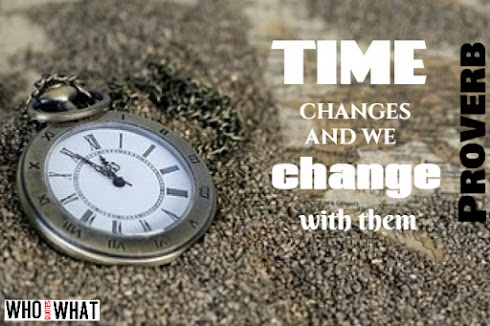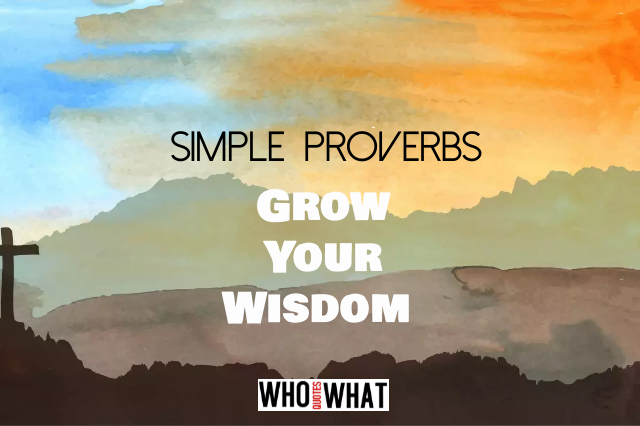Proverbs are concise expressions of widely held truths or practical pieces of wisdom. They are often handed down through generations within a culture or community. Proverbs typically offer advice or insight into human behavior, morality, or life experiences. They are characterized by their brevity, simplicity, and memorable nature, making them easy to recall and apply in various situations.
Proverbs can be found in literature, folklore, religious texts, and everyday speech across cultures worldwide. Examples include “A stitch in time saves nine,” “Actions speak louder than words,” and “All that glitters is not gold.”

Proverbs are short, pithy sayings that express a general truth or piece of advice. They are often used to convey wisdom or moral lessons. Proverbs can be found in many cultures and languages around the world.
Proverbs are a fascinating aspect of language and culture, offering insights into the values, beliefs, and wisdom of societies throughout history. Here are some key points about proverbs:
Cultural Significance:
Proverbs are deeply embedded in cultural traditions and often reflect the values, beliefs, and experiences of a particular society. They serve as a means of passing down wisdom from one generation to another.

Universal Themes:
While proverbs vary from culture to culture, they often address universal themes such as love, friendship, honesty, hard work, and perseverance. Despite cultural differences, many proverbs convey similar messages across different societies.
Brevity and Memorability:
Proverbs are known for their brevity and memorability. They are typically short, pithy expressions that encapsulate a larger truth or piece of wisdom. This brevity makes them easy to remember and share in everyday conversation.

Metaphorical Language:
Proverbs often use metaphorical language to convey their messages. They may employ imagery, symbolism, or analogies to make their point in a concise and vivid manner.
Adaptability:
Proverbs have a remarkable adaptability, allowing them to evolve over time and across cultures. They can be modified, combined, or reinterpreted to suit different contexts while still retaining their core meaning.

Functions:
Proverbs serve various functions within a society. They can be used to teach moral lessons, offer practical advice, provide comfort or encouragement, or even serve as social commentary.
Literary and Cultural Heritage:
Proverbs have long been valued in literature and oral tradition. They appear in religious texts, folklore, fables, and ancient wisdom literature, as well as in modern literature, poetry, and speeches.

Continued Relevance:
Despite the passage of time, many proverbs remain relevant in contemporary society. They continue to offer valuable insights into human nature and provide guidance for navigating life’s challenges.
Overall, proverbs play a significant role in shaping language, culture, and societal norms, serving as timeless sources of wisdom and inspiration.

POPULAR PROVERBS ON LIFE & WISDOM
“Two wrongs don’t make a right.”- proverb
“The pen is mightier than the sword.” – proverb
“When in Rome, do as the Romans.” – proverb

The squeaky wheel gets the grease.” – proverb
“When the going gets tough, the tough get going.” – proverb
“No man is an island.” – proverb
“Fortune favors the bold.” – proverb

“People who live in glass houses should not throw stones.” – proverb
“Hope for the best, but prepare for the worst.” – proverb
https://whoquoteswhat.com/2017/07/31/popular-proverbs/ : SIMPLE PROVERBS TO GROW YOUR WISDOM
“Better late than never.” – proverb
“Birds of a feather flock together.” – proverb

“Keep your friends close and your enemies closer.” – proverb
“A picture is worth a thousand words.” – proverb
“There’s no such thing as a free lunch.” – proverb
“There’s no place like home.” – proverb

“Discretion is the greater part of valor.” – proverb
“The early bird catches the worm.” – proverb
“Never look a gift horse in the mouth.” – proverb
“You can’t make an omelet without breaking a few eggs.” – proverb
“God helps those who help themselves.” – proverb

“Honesty is the best policy.” – proverb
“Absence makes the heart grow fonder.” – proverb
“You can lead a horse to water, but you can’t make him drink.” – proverb
“Don’t count your chickens before they hatch.” – proverb
“If you want something done right, you have to do it yourself.”- proverb
[Image Courtesy: Images used on Who Quotes What site are taken from various own sources including Pixabay, Unsplash, Freepik, Wikimedia Commons, Google Photos etc]
[ We do not believe that any knowledge, or information is copyrighted. The work of this site is to bring out one or two from the countless books published on the earth, the knowledge of the ocean in the library, the information of the sky spread on the internet and put it in front of the readers. Quotes are taken from ‘wikiquotes’ also. However, WHO QUOTES WHAT will not publish any wrong, distorted, or blind information ]





